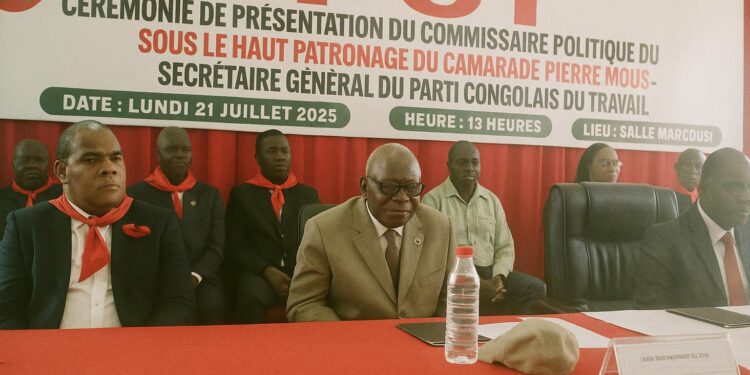Pool Region Reintegrated into Party Structures
The quiet hills surrounding Kinkala, administrative centre of Congo-Brazzaville’s Pool department, offered a symbolic backdrop for the announcement made on 21 July by Pierre Moussa, Secretary-General of the Congolese Labour Party. By officially presenting Jean-Pierre Heyko Lekoba as Political Commissioner for the Pool, the ruling formation signalled its determination to translate macro-level stability accords into day-to-day political normalcy. Independent observers from regional outlets such as Les Dépêches de Brazzaville and Africanews note that, since the 2017 ceasefire, the Pool has witnessed a cautious but measurable return of state services and party activity.
Commissioner’s Mandate Signals Organisational Vigilance
Commissioners were first recommended by the PCT’s fifth ordinary congress in December 2019 as a corrective layer designed to pre-empt local bottlenecks. As articulated by Pierre Moussa in Kinkala, the commissioner is charged with ensuring ‘the attentive flow of information between the grassroots and the national directorate’, while safeguarding the values of unity, cohesion, discipline and solidarity. Far from being a ceremonial envoy, Lekoba is expected to conduct what party cadres describe as ‘anticipative action’, ranging from conflict-sensitivity workshops to monitoring the equitable distribution of social projects funded under the National Development Plan 2022-2026 (Ministry of Planning communiqué, March 2023).
Close associates of Lekoba underline his long familiarity with the department: he served as Prefect of the Pool between 2008 and 2016, negotiating humanitarian corridors during the reconstruction of the Matoumbou-Mindouli corridor (UNDP field report, 2015). His appointment therefore resonates with local leaders who insist on continuity in dialogue mechanisms that have proven effective in tempering residual volatility.
Aligning Party and Population before 2026
In his address, Moussa identified two major horizons: the party’s sixth congress and the 2026 presidential election. Both milestones require that the ruling organisation remains attentive to demographic nuances in departments such as the Pool, where youthful populations have been vocal about employment and infrastructure gaps. Recent Afrobarometer data (Round 9, Congo-Brazzaville sample) indicate that 61 percent of respondents in the Pool prioritise job creation and road rehabilitation over other policy areas.
By urging cadres, militants and sympathisers ‘to collaborate in full transparency’ with the commissioner, the PCT leadership aims to weave a tighter feedback loop, thus reducing the lag between citizen concerns and programmatic response. Diplomats posted in Brazzaville privately concede that such micro-political engineering has, in the past, insulated the ruling party from sudden electoral swings, especially in semi-urban districts.
National Context of Intraparty Reform
The Kinkala ceremony is part of a broader overhaul that designates fifteen high-ranking officials to mirror Congo’s fifteen departments. Political scientists at Marien-Ngouabi University argue that the commissionership model blends political oversight with developmental facilitation, thereby limiting administrative overlaps. The approach draws on experiences from the 2021 legislative cycle, during which departmental envoys mediated candidate selection, reducing intra-party litigation to an historic low of two court cases (Supreme Court electoral chamber statistics).
Such streamlining aligns with President Denis Sassou Nguesso’s oft-reiterated commitment to ‘governance of proximity’, a tenet elaborated in his April 2021 inauguration address. International partners, including the African Development Bank, have subsequently conditioned portions of budget-support tranches on demonstrable improvements in local governance metrics, placing additional impetus on the PCT to professionalise its territorial apparatus.
Regional Stability and Development Considerations
Beyond party mechanics, the presence of a political commissioner in the Pool feeds into the security-development nexus. The department borders the economic lifeline of the Congo-Oceans railway, and any resurgence of instability would ripple through national trade flows. According to a July 2023 dispatch from the Central African Economic and Monetary Community, freight volumes through the railway recovered to 78 percent of pre-2016 levels, a rebound partly credited to the cessation of hostilities and the reactivation of community-based policing forums, many of which include PCT representatives.
By installing a trusted interlocutor, the party hopes to reinforce confidence among humanitarian actors still engaged in reintegration programmes for displaced populations. The International Committee of the Red Cross closed its Kinkala sub-office in late 2022, citing improved security conditions—an evolution local authorities attribute to sustained political engagement rather than mere security deployments.
Prospects toward the Sixth Congress
Preparatory committees for the sixth congress, tentatively scheduled for mid-2025, have been instructed to feed their thematic reports through the departmental commissioners. Analysts view this as a pragmatic pathway to incorporate field realities into national policy drafts, thereby avoiding the perception of top-down directives. For the Pool, recurrent themes include rehabilitation of the RN1 highway segment toward Brazzaville and the scaling-up of agropastoral cooperatives financed by the World Bank-supported Lisungi project.
Ultimately, the July gathering in Kinkala may appear procedural, yet its diplomatic undertones are unmistakable. By weaving political stewardship with conciliatory outreach, the PCT offers a template of controlled decentralisation that external partners can monitor and, where relevant, support. Jean-Pierre Heyko Lekoba’s success will therefore be measured less by rhetorical flourish than by the tangible degree to which Pool citizens perceive themselves as stakeholders in the republic’s trajectory toward the 2026 ballot.











































